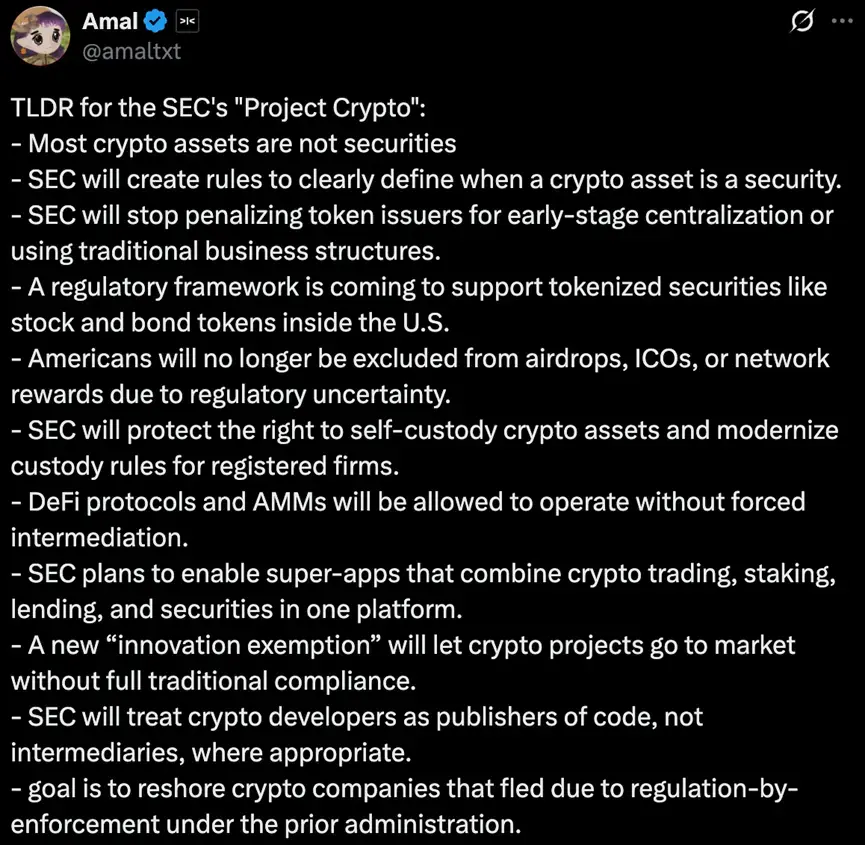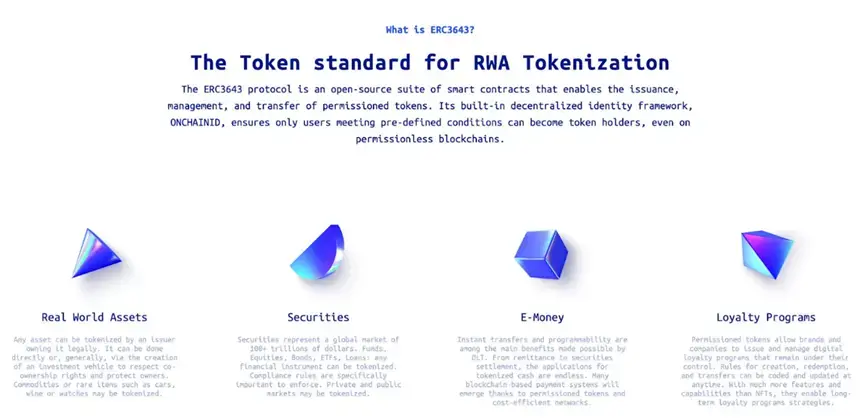Author: TPan
Translation: Felix, PANews
The Chairman of the U.S. Securities and Exchange Commission (SEC) today launched the "Project Crypto" initiative aimed at supporting cryptocurrency innovation in the United States. Although there had been previous signs (e.g., a reduction in lawsuits and investigations against numerous institutions such as Binance, Coinbase, Crypto.com, Immutable, Yuga, Kraken, Gemini, Consensys, OpenSea, Uniswap, etc.), this move not only reverses the damage caused over the past few years but also lays a solid foundation for the next phase of development in the U.S. cryptocurrency sector.
To be honest, when I read Chairman Paul Atkins' speech, I personally had not yet psychologically recovered from the SEC's crackdown on the crypto industry over the past few years.
The following image shares key points from Amal at Dragonfly, and I will elaborate on some of these points and their potential impacts.
SEC "Project Crypto" Overview:
- Most crypto assets are not securities.
- The SEC will establish rules to clearly define when crypto assets constitute securities.
- The SEC will stop penalizing early centralized or traditional business structure token issuers.
- A regulatory framework will be introduced to support tokenized securities such as stock and bond tokens within the U.S.
- Due to regulatory uncertainty, Americans will no longer be excluded from airdrops, ICOs, or network rewards.
- The SEC will protect the self-custody rights of crypto assets and update the custody rules for registered companies.
- DeFi protocols and automated market makers (AMMs) will be allowed to operate without mandatory intermediaries.
- The SEC plans to launch a super application that integrates crypto trading, staking, lending, and securities on one platform.
- A new "innovation exemption" will allow crypto projects to enter the market without fully complying with traditional regulations.
- The SEC will consider cryptocurrency developers as code publishers rather than intermediaries when appropriate.
- The goal is to bring back cryptocurrency companies that fled due to the previous government's stringent regulations.

Classification of Crypto Assets
"I have instructed the commission staff to develop clear guidelines so that market participants can determine whether crypto assets are securities or constitute investment contracts. Our goal is to help market participants classify crypto assets, such as digital collectibles, digital goods, or stablecoins, and assess the economic substance of transactions. This approach allows market participants to judge whether the issuer has ongoing commitments or obligations based on clear guidelines, thereby determining whether the asset constitutes an investment contract."
This statement is noteworthy for the following reasons:
- The SEC recognizes the richness of the crypto ecosystem and supports the creation of various types of assets. When the average person hears the term "cryptocurrency," they think of Bitcoin or their favorite memecoin. However, the scope of crypto assets goes far beyond these, and not every asset should be treated the same.
- Specifically, regarding NFTs ("digital collectibles"), the SEC filed a lawsuit against Stoner Cats in September 2023, accusing it of issuing NFTs without registration.
The SEC acknowledges that its past enforcement actions are now outdated and will establish reasonable guidelines (rather than through enforcement regulation) to provide space for builders and creators to thrive.
Imagine if your Labubu collectibles had to be registered with the SEC; what a sight that would be!
Rules and guidelines cannot be one-size-fits-all; the nuances of each asset type must be recognized.
Including Americans in Token Rewards
"I have asked the staff to propose specific disclosure, exemption clauses, and safe harbor provisions, including for so-called 'initial token offerings,' 'airdrops,' and network rewards. For such transactions, our goal should be to ensure that issuers no longer exclude U.S. users from their distributions due to legal complexities and litigation risks, but rather choose to include Americans to enjoy legal certainty and a more relaxed regulatory environment."
If you are in the U.S. (and a few other jurisdictions) and actively participate in different projects, platforms, and protocols, you may have encountered pages like this when trying to claim an airdrop:

Do these projects have something against Americans? No, they are just concerned that providing rewards to users in certain countries/regions could trigger legal or regulatory risks. The goal of crypto projects is to eliminate these restrictions, thus no longer "protecting" U.S. users.
The obvious beneficiaries of this regulation will be U.S. users, followed closely by the projects themselves and the builders.
Less legal risk and emotional burden, and most importantly, less friction. Users will no longer need to struggle to turn on a VPN or take other measures to claim airdrops. Meanwhile, teams will be better able to understand the effectiveness of the activities they have been preparing for months and focus on more important matters.
Innovation Exemption
"Under my vision for the innovation exemption, innovators and visionaries will be able to enter the market immediately with new technologies and business models without having to comply with incompatible or cumbersome regulatory requirements that hinder economic activity. Instead, they will only need to adhere to certain principle-based conditions to achieve the core policy goals of federal securities law. These conditions may include a commitment to regularly submit reports to the commission, adopting whitelist or 'verification pool' features, and allowing only securities tokens that meet compliance functionality standards (such as ERC3643) to circulate."
This part is interesting because it mentions ERC-3643, an open-source token standard for RWA tokenization. The SEC recognizes that the industry has been working to build a framework that can complement their upcoming guidelines.

Unlike the past wait-and-see attitude, builders can continue to push the boundaries of on-chain applications without having to "break the mold" in their thinking, but rather build upon existing frameworks and further expand these frameworks.
Why Is This Important?
Clearly, this is crucial for legal professionals in the industry, but it is equally important for all types of operators and roles to closely monitor these developments.
The line between strictly prohibited actions and fair competitive practices remains blurred, but it is shifting in favor of creativity. Many mechanisms that were once seen as risky will no longer be viewed as such but rather as strategies or tactics that can be optimized and expanded. Great ideas that were once vetoed by legal departments can now be revisited with more confidence.
Cheers to the SEC's transformation. Looking forward to a new chapter opening in the U.S. and globally, witnessing these ideas being licensed and potentially realized.
Related Reading: "Full Text of SEC Chairman's Speech on 'Crypto Plan'"
免责声明:本文章仅代表作者个人观点,不代表本平台的立场和观点。本文章仅供信息分享,不构成对任何人的任何投资建议。用户与作者之间的任何争议,与本平台无关。如网页中刊载的文章或图片涉及侵权,请提供相关的权利证明和身份证明发送邮件到support@aicoin.com,本平台相关工作人员将会进行核查。




